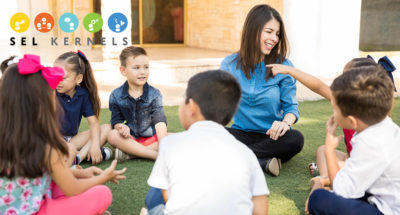
Feelings Circle: An SEL Kernels Practice for Kindergarten
In a group meeting, students share their feelings while also building their feelings vocabulary and emotion knowledge.

In a group meeting, students share their feelings while also building their feelings vocabulary and emotion knowledge.
Students will:
Take a moment to notice how you feel right now. Are you feeling more than one emotion? Can you identify those emotions? How do they show up in your body? If you’re feeling one or more challenging emotions, take a few deep breaths to relax and let the emotions go.
Note: Click here to download and print a card version of this practice that can be added to the other SEL Kernels practices to make an easy-to-use hand-held collection.
Choose a time to do this 15-minute routine (suggested: morning meeting, pre-academics, after recess).
This practice is part of the SEL Kernels project developed by the EASEL Lab at Harvard University.
Do you notice students talking about how they feel more frequently? Are they noticing how other students might be feeling, or how characters in a book are feeling?
Young children who can accurately read facial expressions and assign an appropriate emotion to a situation perform better academically, have fewer behavior problems, and demonstrate greater prosocial (kind, helpful) behavior.
Knowledge about emotions is key to student success, and learning about emotions early helps students in the long run. Children must use these skills whenever faced with tasks that require emotional, behavioral, and interpersonal regulation. Emotional skills allow children to recognize how different situations make them feel and to address those feelings in prosocial ways.
Consequently, these skills are often fundamental to positive social interactions and critical to building relationships with peers and adults; without the ability to recognize and regulate one’s emotions or engage in empathy and perspective-taking, it becomes very difficult to interact positively with others.
Indeed, first graders who showed little knowledge of emotions were more likely to report feelings of loneliness, sadness, and anxiety in fifth grade. Teens, too, who score high in emotional intelligence have greater academic success, fewer mental health issues, and better attitudes towards teachers and schools.

Are you ready to build a kinder, happier school where everyone belongs? Join Greater Good Educators! Explore the science of well-being in a supportive community of educators from around the world. Registration is now open for the 2025-2026 school year!
Comments